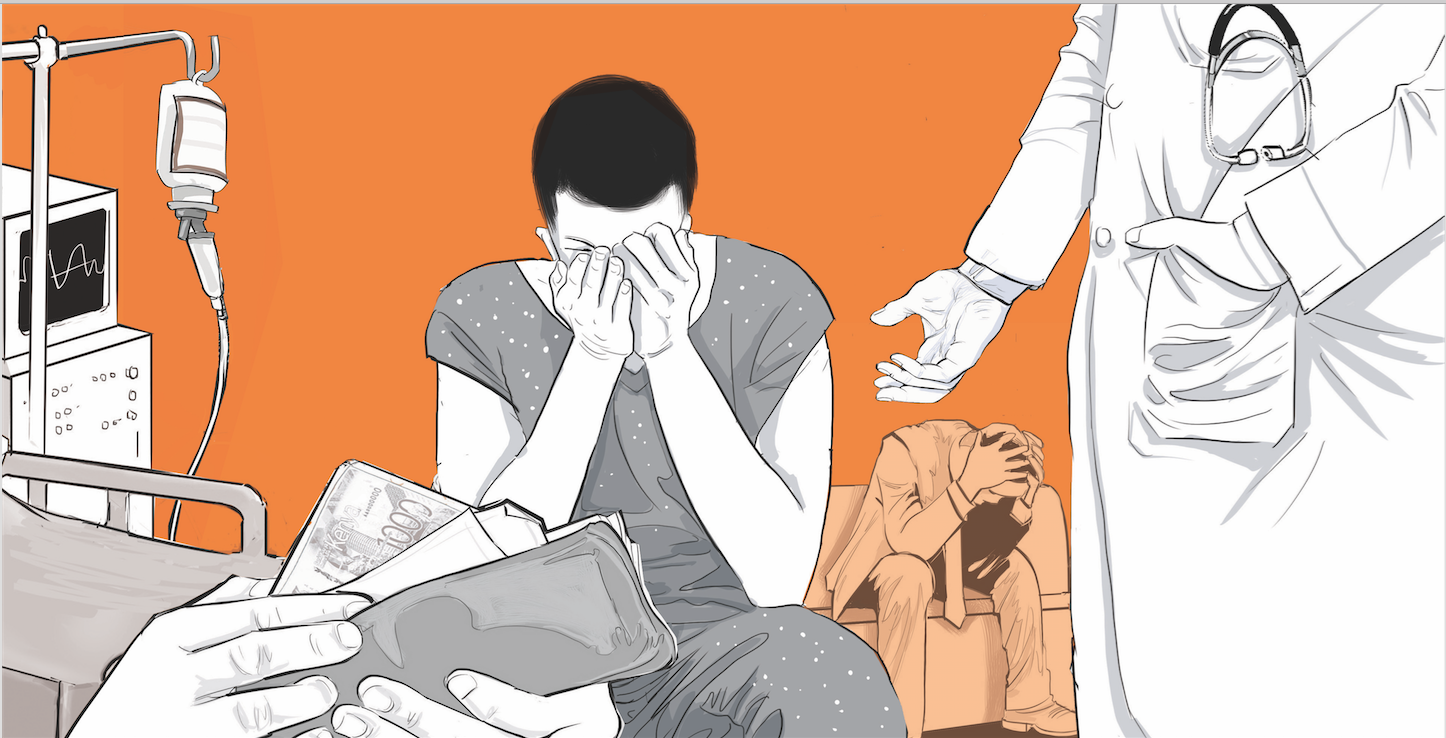

Universal Health Coverage was supposed to be our national
promise, a poetic vision where no one would have to choose between buying
antibiotics and buying ugali. Yet in the present reality, that “universal” part
is a bit like the moon in your primary school composition: always there in
theory, but you only ever see it from a distance.
The cost of healthcare has risen so sharply that it now has its own altitude sickness. The World Bank might call it “unsustainable expenditure growth”. Ordinary Kenyans call it “Hii ni wizi.”
Private hospitals resemble luxury hotels with ICU wings. The price of a simple lab test can rival a Nairobi rent payment, and a single night in hospital might require either a medical insurance card or a very persuasive prayer life.
Why is healthcare so expensive (and who’s laughing all the way to the bank)? Corruption; insurance companies perfected the art of “strategic denial” via policies with clauses you never noticed, like “excludes breathing”; public policy amnesia; profit-driven model with shareholders who expect high returns pushing pricing upward to maintain profit margins; overhead costs from ‘luxury care’ in the form of high-end facilities whether or not the patient needs them; imported medical supplies and equipment with costs and currency exchange fluctuations passed directly to the patient; specialist salaries and retention especially in competitive urban markets; expensive technology adoption with purchase and maintenance costs recovered by charging higher procedure fees; in-house pharmacy and lab markups, a monopoly of charging far more than independent labs or pharmacies for the same items; lack of price regulation-no effective laws capping how much private facilities can charge for hence prices are set at “what the market will bear”; over-treatment and over-diagnosis in the form of unnecessary tests, procedures, or admissions to maximize revenue, sometimes justified as “thorough care,” but often adding avoidable costs; insurance-driven inflation a practice that drives up premiums and prices across the sector; weak public sector Competition hence patients with means have no alternative.
The effects? The death of UHC dreams. The high cost of care turns sickness into a financial crime that can only be managed through catastrophic health expenditure. Families are forced to sell land, cows, and in extreme cases, the family WhatsApp group admin rights; preventive care becomes a luxury; overflow of patients waiting for treatment approval; and UHC is reduced to a slogan printed on glossy banners at health conferences, “Health for All” while citizens outside the gate line up to pay for malaria treatment they can’t afford.
Solutions? Local manufacturing revolution at the same rate we produce world-class athletes and music stars; transparent online procurement–if a wheelchair is listed at the price of a Toyota, the supplier should automatically receive a free trip to the nearest Ethics and Anti-Corruption Commission office.
Primary healthcare should come first–UHC should not mean universal access to expensive surgeries; insurance reforms should make insurance contracts readable without a law degree and outlaw denial of claims for frivolous reasons.
We should have price transparency laws like publishing the cost of every service, procedure and even the drinking water in patient rooms; and rate caps for essential services—nobody should have to mortgage their house for oxygen.
The system can also come up with mandatory charity care quotas for treating patients who cannot pay, with public reporting on how many were helped; and ban the inflated in-house pharmacy model, allowing patients to buy prescribed drugs from external suppliers at market prices instead of paying hospital-gift-shop rates.
The government can introduce luxury tax on medical price gouging–if a private hospital insists on charging hotel-level rates, tax them like luxury resorts and channel the money into public health facilities; and arrange public-private accountability forums where private hospital CEOs explain their pricing structures under oath with journalists and citizen groups in the room.
In the end, UHC will remain a cruel joke if private hospitals keep operating as unregulated cash registers with stethoscopes. The problem is not that they are making a profit, it’s that they are doing it with surgical precision on the patient’s wallet. Healthcare should heal bodies, not break bank accounts. And if private hospitals do not want to be regulated into compassion, then perhaps they should admit what they really are—luxury brands that happen to offer surgery.
UHC should not be a riddle where the answer is always “pay up or perish.” A health system that bankrupts the sick is a sick system. The real cost of healthcare is not in shillings or dollars, it’s in dignity. And once you lose that, no insurance policy in the world will cover the damage.
Cosmas is a Healthcare leadership scholar at the University of Oxford’s Saïd Business School and the Nuffield Department of Primary Care Health Sciences













